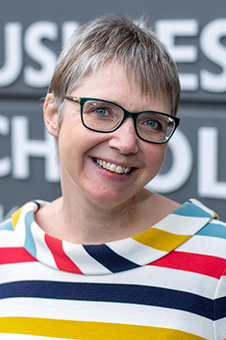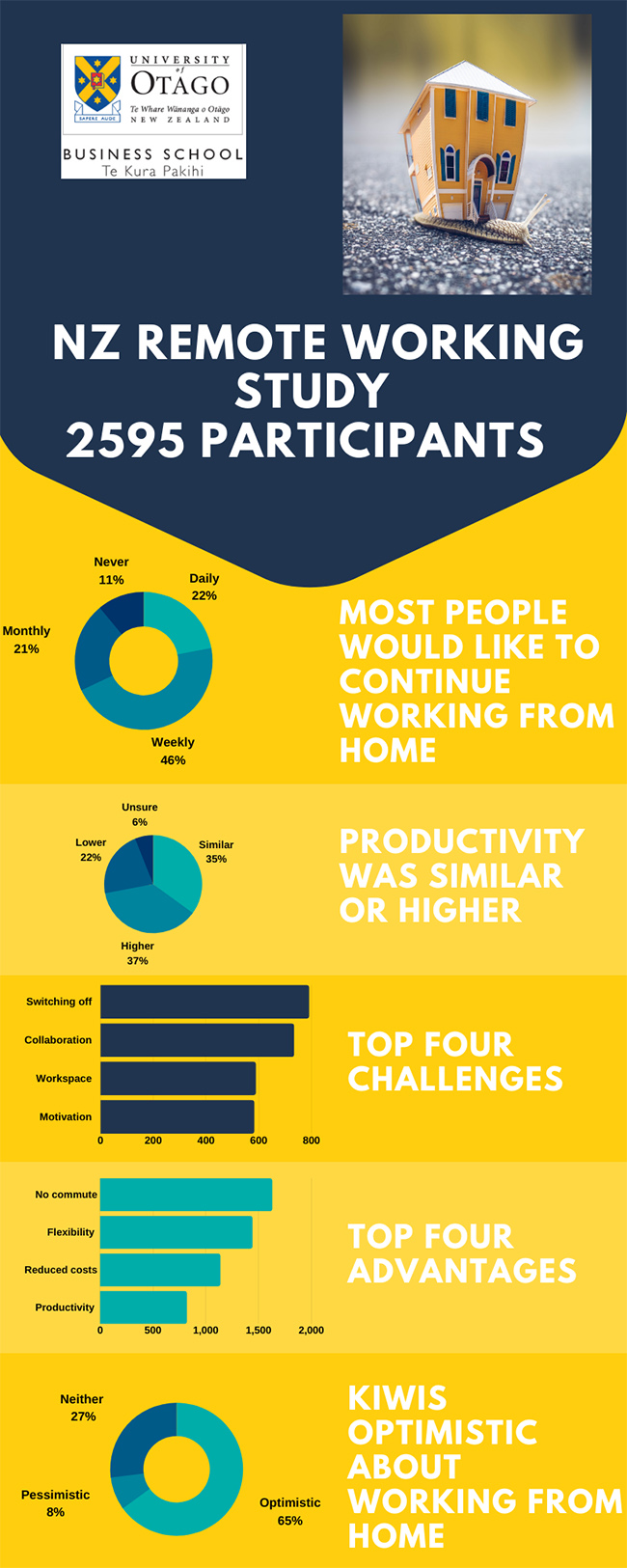A University of Otago study of 2,595 New Zealanders working from home during lockdown suggests that most people were equally or more productive (73 per cent), and that many want to continue to work from home at least part of the time post lockdown (89 per cent).
The results show that working from home was new to most people, and that 65 per cent were feeling optimistic that they will be able to continue some form of remote working, representing a significant shift in our work behaviour.
When asked what the challenges might be to working from home in the future, 27 per cent saw none, while 22 per cent thought their organisation would not support it, and 13 per cent thought their manager would not.

Dr Paula O'Kane.
The research was a product of the Work Futures Otago Group of Associate Professor Sara Walton, Dr Paula O'Kane, and Dr Diane Ruwhiu, from the Otago Business School at the University of Otago. It used responses to a public online survey collected between 6 and 25 May, with most responses occurring during level three of lockdown.
The study authors say not surprisingly participants enjoyed the benefit of greater flexibility in managing their day, although this does need be to tempered by the differences between working parents or caregivers and those with no responsibilities – this was a unique time. Balancing work and family was difficult. As too was switching off from work.
“Both employers and the government have a role to play in educating employees working from home in the future about their wellbeing and how to place separation between work and home. Exhaustion was specifically mentioned by many participants,” says Dr O'Kane, a specialist in organisational behaviour and human resource management in Otago's Department of Management.
Collaboration and communication with co-workers was also harder. Most people had more meetings virtually than when we were face-to-face and there was much mention of “zoom fatigue”. It seems that a large number of people prefer to see people when in video conference meetings with 71 per cent preferring to have the camera on.
The lack of traffic and the daily commute was seen as the biggest advantage of working from home. Some mentioned that reducing emissions was also an advantage. An added bonus for employees was the reduced costs resulting from not going to work.
However, the survey also demonstrated that many health and safety concerns were present during lockdown. The quick move to home meant workspaces where not ergonomically setup, although most respondents said they had a separate workspace. Mental well-being was also a challenge, with respondents discussing anxiety surrounding COVID-19, the stress of virtual communication, the increased workload expectations from their employers and juggling home schooling and childcare. Workload expectations and successful communication and collaboration will need to be addressed for working from home to continue. The responsibility for home working is a grey area, and not clearly covered under the Health and Safety at Work Act. As employers look to the future, they will need to consider how they address this, and government may have a role to play in providing better guidance.
Drawing on the results from this study, the authors challenge organisations to listen to their employees and to consider how flexibility can be harnessed to benefit both the individual and the organisation. New Zealanders reacted to this crisis by utilising their number eight wire mentality and setting up home working spaces which, although not ideal, were surprisingly workable for many.
“Let's make sure that worker commitment to their organisation and to their work during the lockdown is rewarded by listening to how employees can work effectively in the future. Let's recreate the norm,” Dr O'Kane says.
Other key results:
- 38 per cent had never worked from home in any way.
- 66 per cent of people found it easy or somewhat easy to work from home.
- 83 per cent had confidence that their organisations was doing its best during lockdown.
- 82 per cent felt they had the right resources to do their job, although only 17 per cent had all those resources provided by their company.

For more information, contact:
Dr Paula O'Kane
Department of Management
University of Otago
Email paula.okane@otago.ac.nz
Mark Hathaway
Senior Communications Adviser
University of Otago
Mob +64 21 279 5016
Email mark.hathaway@otago.ac.nz
FIND an Otago Expert
Use our Media Expertise Database to find an Otago researcher for media comment.







